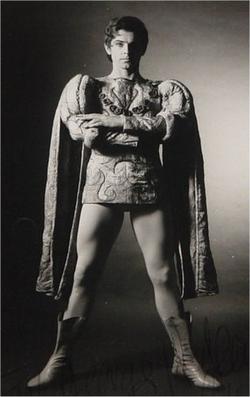
Dame Margaret Evelyn de Arias DBE, known by the stage name Margot Fonteyn, was an English ballerina. She spent her entire career as a dancer with the Royal Ballet, eventually being appointed prima ballerina assoluta of the company by Queen Elizabeth II. Beginning ballet lessons at the age of four, she studied in England and China, where her father was transferred for his work. Her training in Shanghai was with Russian expatriate dancer Georgy Goncharov, contributing to her continuing interest in Russian ballet. Returning to London at the age of 14, she was invited to join the Vic-Wells Ballet School by Ninette de Valois. She succeeded Alicia Markova as prima ballerina of the company in 1935. The Vic-Wells choreographer, Sir Frederick Ashton, wrote numerous parts for Fonteyn and her partner, Robert Helpmann, with whom she danced from the 1930s to the 1940s.

The Royal Ballet is a British internationally renowned classical ballet company, based at the Royal Opera House in Covent Garden, London, England. The largest of the five major ballet companies in Great Britain, the Royal Ballet was founded in 1931 by Dame Ninette de Valois. It became the resident ballet company of the Royal Opera House in 1946, and has purpose-built facilities within these premises. It was granted a royal charter in 1956, becoming recognised as Britain's flagship ballet company.

Natalia Romanovna Makarova is a Russian prima ballerina and choreographer. The History of Dance, published in 1981, notes that "her performances set standards of artistry and aristocracy of dance which mark her as the finest ballerina of her generation in the West."

Alessandra Ferri OMRI is an Italian prima ballerina. She danced with the Royal Ballet (1980–1984), American Ballet Theatre (1985–2007) and La Scala Theatre Ballet (1992–2007) and as an international guest artist, before temporally retiring on 10 August 2007, aged 44, then returning in 2013. She was eventually granted the rank of prima ballerina assoluta.

Katherine Healy is an American former principal ballerina and actress who also had a professional performing career in figure skating.
Sir Anthony James Dowell is a retired British ballet dancer and a former artistic director of the Royal Ballet. He is widely recognized as one of the great danseurs nobles of the twentieth century.
Nadia Nerina was a South African dancer who was "one of the most gifted, versatile, and inspiring ballerinas of The Royal Ballet" during the 1950s and 1960s. She was known "for her technical virtuosity, lightness afoot, effortless-seeming jumps, and joyful charm onstage, especially in comedic roles."
Dame Merle Park, is a British ballet dancer and teacher, now retired. As a prima ballerina with the Royal Ballet during the 1960s and 1970s, she was known for "brilliance of execution and virtuoso technique" as well as for her ebullience and charm. Also admired for her dramatic abilities, she was praised as an actress who "textured her vivacity with emotional details."

Élisabeth Platel is a French prima ballerina.

Leanne Faye Benjamin is a retired Australian ballet dancer who was a principal dancer with the Royal Ballet in London. She was appointed artistic director at the Queensland Ballet in 2024.

Lynn Seymour was a Canadian-born ballerina, mostly associated with the Royal Ballet in London. She was a muse of choreographer Kenneth MacMillan, creating lead roles in Romeo and Juliet, The Invitation, Concerto, Anastasia and Mayerling, among others. She originated lead roles for several ballets by Frederick Ashton, including The Two Pigeons, Five Brahms Waltzes in the Manner of Isadora Duncan and A Month in the Country. She also guested with various ballet companies throughout her life.
Wayne Eagling is a Canadian ballet dancer, now retired. After more than twenty years as a popular member of The Royal Ballet in London, he became well known as an international choreographer and company director.
David Blair was a British ballet dancer and a star of England's Royal Ballet during the 1950s and 1960s.
Maryon Lane was a South African ballet dancer who became well known in Britain as a ballerina of the Sadler's Wells Theatre Ballet and as a soloist with the Royal Ballet.

Viviana Durante is an Italian ballet dancer, considered one of the great dramatic ballerinas of recent times. She was a principal dancer of The Royal Ballet, American Ballet Theatre, Teatro alla Scala and K-Ballet. She is the artistic director of English National Ballet School and of the Viviana Durante Company.
Annette Page was an English ballerina. She was a principal dancer with the Royal Ballet, and was usually partnered onstage by her husband, Ronald Hynd.
Enigma Variations (My Friends Pictured Within) is a one-act ballet by Frederick Ashton, to the music of the Variations on an Original Theme (Enigma Variations), Op. 36, by Edward Elgar. The work was first given by the Royal Ballet at the Royal Opera House, Covent Garden, London, on 25 October 1968. It has been revived in every subsequent decade.

Derek Rencher was a British ballet dancer. A commanding figure among Royal Ballet character dancers for more than four decades, he was probably the most prolific performer in the company's history.
Bryony Jane Susan St John Brind was a British ballerina and principal dancer with the Royal Ballet.

Francesco Ventriglia is an Italian ballet dancer, choreographer and artistic director. In 2010 he was appointed as Europe's youngest artistic director by the Florence Opera House at the age of 32, where he held the role as artistic director and principal choreographer for Maggio Danza until 2013. In 2014, he was named the artistic director of the Royal New Zealand Ballet until June 2017, and from January 2018, as adjunct artistic director of the National Ballet of Uruguay, Ballet Nacional Sodre alongside Igor Yebra. Ventriglia is also a choreographer of classical and contemporary ballet, having works performed internationally by companies such as the La Scala Ballet, Arena di Verona, Bolshoi Theatre, the Mariinsky Ballet, Grande Theatre du Geneve, Royal New Zealand Ballet, Ballet Nacional Sodre and at the Venice Biannale.












